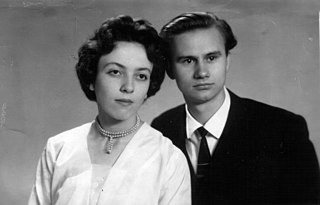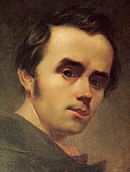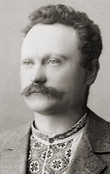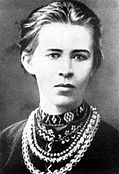
Shevchenko National Prize is the highest state prize of Ukraine for works of culture and arts awarded since 1961. It is named after the inspirer of Ukrainian national revival Taras Shevchenko. It is one of the five state prizes of Ukraine that are awarded for achievements in various fields.

Dnipro is a monthly colour literary magazine in Ukraine. Published as Dnipro since 1944, it has its origins in the Molodniak magazine of 1927. The magazine features prose, contemporary poetry, modern Ukrainian drama, interviews, and reviews.

Iryna Onufriyivna Kalynets was a Ukrainian poet, writer, activist and Soviet dissident during the 1970s. Kalynets was the wife of another Soviet dissident, Ihor Kalynets.
The Vasyl Stus Prize, given since January 1989, is the first non-governmental prize awarded for "talent and courage" and being worthy of the memory of Vasyl Stus. This Prize was set up by the Ukrainian Association of the Independent Creative Intelligentsia and awarded every year on the poet's, Stus', date of birth in Lviv. In 1990 it moved to Kyiv.
Contemporary Ukrainian literature refers to Ukrainian literature since 1991, the year of both Ukrainian independence and the collapse of the Soviet Union. From that year on, censorship in the Soviet Union ceased to exist and writers were able to break openly with the official socialist realism style of art, music, and literature. Principal changes had taken place in Ukrainian literature already under Perestroika (1985) and especially after the Chernobyl disaster. Some researchers consider that modern Ukrainian literature was born during the 1970s and founded by Soviet dissidents from the sixties generation.

Taras Prokhasko is a Ukrainian novelist, essayist and journalist. Together with Yuri Andrukhovych a major representative of the Stanislav phenomenon. Writing of Taras Prokhasko is often associated with magical realism, his novel «The UnSimple» has been compared to One Hundred Years of Solitude by Gabriel García Márquez. Biologist by education Prokhasko's prose has been called to have features of "philosophy of a plant" for its dense and meditative character.
The Antonovych Prize is an annual award of US$10,000 given by the Omelian and Tetiana Antonovych Foundation, since 1981 for literary works written in Ukrainian and for research in Ukrainian studies. Institutions, individuals, and members of the prize jury can make nominations, but only the jury decides the winners. Laureates are asked to give a speech at an award ceremony.

The governor of Sumy Oblast is the head of executive branch for the Sumy Oblast.

The Honorary Diploma of the Verkhovna Rada of Ukraine is an award of the Verkhovna Rada (parliament) of Ukraine for significant contribution to any sphere of life, outstanding socio-political activities, services to the Ukrainian people in promoting and strengthening Ukraine as a democratic, social, legal state, implementing measures to ensure rights and freedoms of citizens, development of democracy, parliamentarism and civil harmony in society, and active participation in legislative activities.

The Honorary Diploma of the Cabinet of Ministers of Ukraine is a government award for many years of hard work, exemplary performance of official duties, personal contribution to economic, scientific, technical, socio-cultural, military, public and other spheres of activity, service to the Ukrainian people in promoting the rule of law and implementation of measures to ensure the protection of the rights and freedoms of citizens, the development of democracy, and the effective operation of executive bodies and local governments.
Science fiction, fantasy and horror are literary subgenres of speculative fiction found in Ukrainian literature and media, written in Ukraine or by Ukrainian writers in both Ukrainian, Russian, Crimean Tatar, & some other languages. The most influential classic writer of Ukrainian science fiction is Oles Berdnyk.
Anna-Galya Gorbach, née Lutsyak was a Ukrainian literary critic, translator of Ukrainian literature into German, publisher, and public and political figure. Doctor of Philosophy, member of the National Writers' Union of Ukraine (1993), corresponding member of the Shevchenko Scientific Society in Europe, winner of the Ivan Franko literary prize (1994), the Vasyl Stus award of the Ukrainian Association of Independent Creative Intelligentsia (1993), the Triumph Award (2001), the Olena Teliga (2009), Panteleimon Kulish (2019). A wife of a Ukrainian philologist and publisher Oleksa Gorbach. One of the most famous and active personalities in the Ukrainian cultural and intellectual world of the Ukrainian diaspora.












